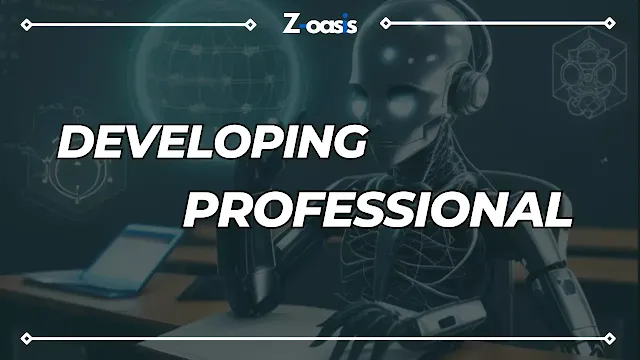The transformative capacity of artificial intelligence (AI) is being recognized in various sectors, including education. By offering educators the means to refine the way they teach, AI helps teachers optimize their roles, positively impacting student success. Furthermore, it keeps educators in the loop with respect to evolving trends in teaching methodology and pedagogical approaches. In this piece, we delve into the multifaceted ways AI can support teachers and boost their professional Development.
 |
| Enhancing Teacher Support and Developing Professional Skills through AI |
Streamlining Lesson Planning with AI
Crafting a compelling lesson plan involves a careful blend of adhering to curriculum standards, identifying student requirements, and devising effective pedagogical strategies. AI technologies serve as a reliable guide in this critical task, consuming vast educational data and giving tailored advice. Thanks to intelligent algorithms, teachers can access rich repositories — complete with lesson outlines, teaching aids, and multimedia content — all personalized to their pedagogical goals and the students they teach. Also, by examining student performance indicators, AI can propose varying educational methods and strategies, enabling teachers to flexibly adjust their lessons.
Intelligent Content Formation
Teachers often find generating stimulating and interactive learning content a time-consuming aspect of their role. AI chips in here by bringing automation to content generation. With tools like natural language processing and machine learning, AI can create educational resources like quizzes, questionnaires, and interactive simulations. These resources, specifically designed to align with diverse student needs and unique learning objectives, free up valuable time for teachers to focus on more minute aspects of their practice.
Bespoke Professional Development
The potency of the teaching profession relies substantially on constant skill development and staying current with developing educational practices. AI, through its analysis of teaching techniques, student data, and professional goals, can tailor-make professional Development opportunities for teachers. With sophisticated AI-powered platforms, teachers are recommended the most suitable professional development events, such as courses, seminars, and educational resources. These platforms also monitor teachers' growth, offer constructive feedback, and highlight areas for possible betterment, thereby fostering their professional Development continually.
Intelligent Feedback Assessment
Prompt and comprehensive feedback is vital for any educational process to succeed. AI lends a hand to teachers by automating the grading process, providing personalized reaction instantly. Algorithms working behind the scenes analyze student outputs, recognize patterns, and deliver quick evaluations on assignments, quizzes and tests. Therefore, AI saves time for teachers while granting them the possibility of providing more nuanced and pinpointed feedback to students. What's more, AI produces in-depth analysis and reports on student performance, enabling educators to identify areas of strength or weakness and adjust their teachings as needed.
Virtual Teaching Assistants
AI-powered virtual teaching aides offer additional help to educators by answering student queries, elaborating on complicated topics, and providing direction where required. They can be integrated within instructional frameworks or digital educational platforms, ensuring help is always at hand for the students. Vitally, they also help teachers in administrative duties such as planning assessments, upkeep of assignments and monitoring student progress. Thus, these virtual assistants ensure teachers can focus on what's truly valuable - the actual student interaction.
Data-guided Decision Making
AI helps educators make informed decisions through analyzing vast amounts of educational data. Informed insights into student performance, identification of learning gaps, and progress tracking becomes a reality with AI. This data-driven approach paves way for evidence-supported decisions about pedagogical strategies, educational interventions, and curriculum tuning. AI goes a step further with predictive analysis, allowing educators to anticipate student requirements in advance, laying ground for proactive measures.
Fostering Collaboration and Sharing of Knowledge
AI-driven platforms stimulate collaboration and knowledge sharing among teachers. They bridge educators from different schools, regions, or even countries, fostering a spirit of cooperation and common learning. AI not only recommends relevant online communities, forums, and professional networks matching teachers' interests, but also enables them to learn from each other, and tap into a wider pool of resources.
In essence, the ability of AI to transform sectors like teacher support and professional development in education is immense. Leveraging AI tools allows teachers to elevate their lesson planning, form personalized content, stay updated with professional opportunities, provide intelligent feedback, harness the services of virtual teaching assistants, make data-driven decisions, and collaborate with the global teaching community. So, as AI evolves, it becomes ever more crucial for teachers to embrace these technological advancements to improve their pedagogical practices and bolster student success.